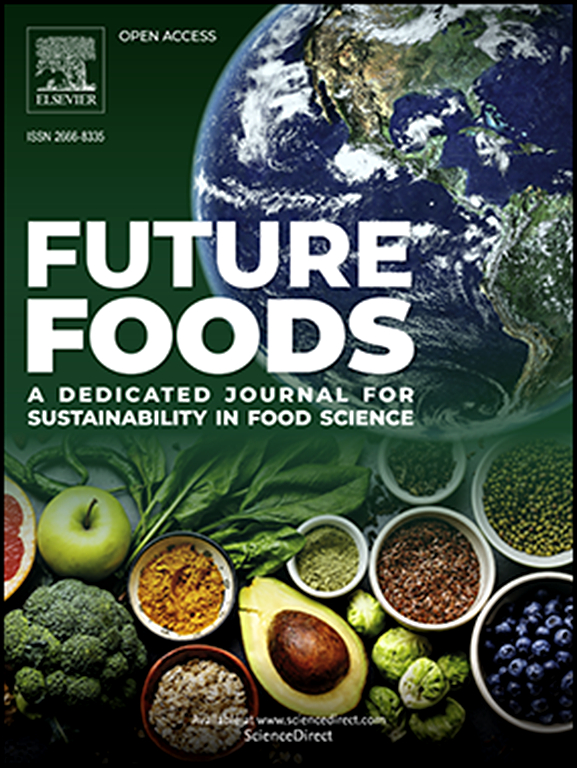Nutritional value and advances of mealworm (Tenebrio molitor) as a sustainable functional ingredient in bakery products: A key step toward sustainable diets
IF 8.2
Q1 FOOD SCIENCE & TECHNOLOGY
引用次数: 0
Abstract
Bakery products are most popular and widely accepted carrier of energy and nutrient in the human daily diet. However, their nutritional quality poses many challenges to achieving balanced diet. Reformulating bakery products to make them healthier could therefore have significant benefits. In recent year, mealworm (MW), Tenebrio molitor, one of the approved edible insects, has gained much attention as promising sustainable functional ingredient, since its high nutritional value and environmental benefits. Therefore, incorporation of MW into bakery products confers interesting opportunities to reformulate bakery products, making them more affordable, sustainable, and healthier. This review aims to provide overview of the nutritional value of MW and conclude current advances in its potential as a functional ingredient in bakery product development. MW is rich source of protein (29.20 % - 64.34 %, w/w), oil (14.875 – 39.60 %, w/w), and minerals, and has been used as wheat flour substitution in various bakery products. Additionally, its incorporation in bakery products improve their nutritional quality, but alter the physical and sensory properties of the final products. Overall, spreading in-depth knowledge can guide further studies on the reformulation of bakery products with MW, thereby meeting with consumers’ expectations and further reducing the distance between the consumers and products.

粉虫(tenbrio molitor)作为烘焙产品中可持续功能成分的营养价值和进展:迈向可持续饮食的关键一步
烘焙食品是人类日常饮食中最受欢迎和广泛接受的能量和营养载体。然而,它们的营养质量对实现均衡饮食提出了许多挑战。因此,改变烘焙产品的配方,使其更健康,可能会带来显著的好处。粉虫(mealworm, tenbrio molitor)是近年来被批准的食用昆虫之一,由于其具有较高的营养价值和环境效益,作为一种有前景的可持续功能成分受到了广泛关注。因此,将MW纳入烘焙产品提供了重新配制烘焙产品的有趣机会,使其更实惠,可持续和更健康。本文综述了小麦籽粒的营养价值,并总结了其在烘焙产品开发中作为功能性成分的潜力。豆粕是蛋白质(29.20% ~ 64.34%,w/w)、油脂(14.875 ~ 39.60%,w/w)和矿物质的丰富来源,已被用作各种烘焙产品中小麦粉的替代品。此外,将其加入烘焙产品中可以改善其营养质量,但会改变最终产品的物理和感官特性。总的来说,传播深入的知识可以指导进一步研究用MW改造烘焙产品,从而满足消费者的期望,进一步缩小消费者与产品之间的距离。
本文章由计算机程序翻译,如有差异,请以英文原文为准。
求助全文
约1分钟内获得全文
求助全文
来源期刊

Future Foods
Agricultural and Biological Sciences-Food Science
CiteScore
8.60
自引率
0.00%
发文量
97
审稿时长
15 weeks
期刊介绍:
Future Foods is a specialized journal that is dedicated to tackling the challenges posed by climate change and the need for sustainability in the realm of food production. The journal recognizes the imperative to transform current food manufacturing and consumption practices to meet the dietary needs of a burgeoning global population while simultaneously curbing environmental degradation.
The mission of Future Foods is to disseminate research that aligns with the goal of fostering the development of innovative technologies and alternative food sources to establish more sustainable food systems. The journal is committed to publishing high-quality, peer-reviewed articles that contribute to the advancement of sustainable food practices.
Abstracting and indexing:
Scopus
Directory of Open Access Journals (DOAJ)
Emerging Sources Citation Index (ESCI)
SCImago Journal Rank (SJR)
SNIP
 求助内容:
求助内容: 应助结果提醒方式:
应助结果提醒方式:


